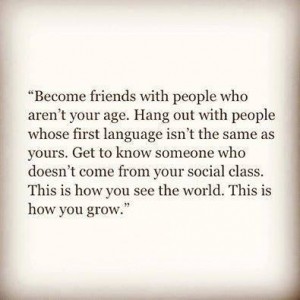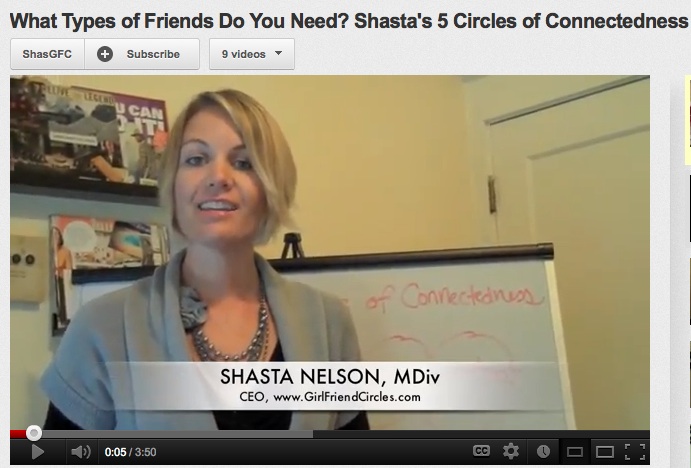You wish you had the kind of girlfriend you could just text a code word to and she'd know exactly how to respond; the friend who would say, "Let's just hang out this weekend" and you'd want nothing more than uninterrupted time with her; the friend who hears that you're sick and shows up with a pot of soup; the friend who seemingly never tires of listening to you rant about X (insert whatever or whoever you feel like you're always worried about!); the friend who includes you in everything; whispers secrets to you that she tells no one else; and the one who just always seems to want to be with you the same amount of time that you want to be with her. Friendship: What We Want & What We Get
When we're feeling that little nagging angst of loneliness-- it's for her that we want. It's for the fantasy best friend that we know would be the Thelma to our Louise, the fork to our spoon, the laughter to our jokes. She would be the finisher of our sentences, the reader of our minds, and the affirmer of our hearts. Our time together would be effortless, easy, safe, and comfortable.
Most of us just ache for her and keep hoping we'll bump into her one day, doing little-to-nothing to actually seek her out. As if she's a unicorn we just have to hope we'll one day spot!
Some of us go one step further and decide to put at least some energy toward the search-- we join sites like www.GirlFriendCircles.com, sign up for workshops and classes, and attend the parties of our friends with a willingness to connect with new friends. We go out looking for her; as though we're casting agents hosting an audition, employers ready to interview for an open position, or headhunters looking for "our types."
But then, much to our dismay, we discover that the difference between what we want and what we get is vastly huge.
Because what we get in a new friend, 90% of the time, is a stranger that we don't yet know as a best friend so we don't yet love her. We get discouraged when she takes three weeks to schedule, skeptical when she seems to have other friends, doubtful when we see that our lives aren't as similar as we had hoped, and judgmental when we see her choose differently than we would have. She's not quite as vulnerable as we like, the conversation doesn't go as deep as we wish, and we're not laughing quite as much as we think we should be.
We meet a whole bunch of candidates who aren't quite good enough to fit our BFF opening so we quietly reject them and keep looking, albeit somewhat disillusioned.
The gap between the women we're meeting and the women we ultimately want as best friends feels far too great to close.
The Myth That Needs Busting: "I'm looking for the right person to be my BFF"
The gap is indeed discouraging between who we want as friends and what we get from the women we're meeting.
But technically that's only disappointing if you expected it to be otherwise.
The myth keeping most women lonely is that they think having close friends is a product of discovering the right person; when the truth is that meaningful friendship is actually a product of developing the right friendship.
And that, my GirlFriends, is good news. Because now we can recognize that a gap doesn't mean she's not the right one! Rather, a gap reminds us that everyone starts as a new/casual friend and some of them over time (and we won't know which ones for quite a while!) can develop into the friendships we crave.
The Truth: Friendships Don't Start With Frientimacy, They Are Developed
Remember my 5 Circles of Connectedness? In this visual we see how all friends have to start on the far left in the Contact Friends Circle and be developed over to the far-right via consistent time together, increased vulnerability, and broader ways of being together.
For example, let's use me for a moment. If you met me today and wanted to be my BFF-- you might judge me against your standards of who you want me to be as a "Commitment Friend." You could think such things to yourself as: "ugh, she already has her good friends... and she's so busy... I want someone who could meet up with me tonight if I wanted... and when I see her she just doesn't open up about her life that much... and I invited her last time and she hasn't reciprocated yet...besides she's x (married, without kids, too young-- pick the one that doesn't match your life)" and your brain would be tempted to rule me out.
But here's the genius: Basically as long as I'm friendly toward you-- then I meet the standards for being your Contact Friend so there's NO need to rule me out! :) For I think I'm a pretty decent friend! (Do I have a witness?! LOL!)
So you wouldn't want to rule me out because I don't treat you like a BFF when we're not!
Your Take-Away: Lower Your Standards!
In other words, don't use the standards you'd have for a best friend for a new friend! For a new friendship: LOWER your standards!
"Lower my standards?" I hear the panic rising in your voice!
Yes, lower your standards. Release your expectations. Stop trying to pick and choose so early in the game. As long as there are no red flags (think abuse, lying, mean spirit) then be open to being surprised by who might develop into a meaningful friend.
Basically, I can let nearly anyone into my Contact Friends Circle. If you're not biting me or screaming at me-- I accept you! Welcome to my Circles!
By letting you in, it doesn't mean that I think we'll become bosom buddies, necessarily; it just means I recognize that all levels of friendship are important and acknowledges that I don't always know which women will be the ones I grow closer to.
(In fact most of my current Commitment Friends weren't necessarily the women I liked more than anyone else I knew at the time... they are merely the ones where the relationship continued to develop, for various reasons.)
From that Circle, some women I'll run into automatically (at school, work, PTA, association gatherings) and we'll eventually make the jump to Common Friends as we grow our friendship. For others, I may need to initiate some time together so we can keep seeing where our friendship progresses.
The truth is that if you and I barely know each other, then you shouldn't be trying to figure out whether I could be your Commitment Friend as much as you should be excited that we're now Contact Friends. And as Contact Friends-- everything I named above as reasons you might rule me out are actually appropriate and healthy actions for that beginning level of friendship. I really shouldn't be expected to be opening up deeply with you yet, dropping everything for you, or feeling pressure to invite you out in order to keep our friendship "equal." You can't judge me or guess what I'll be like as a Committed Friend by how I treat you as a Contact Friend. Does that make sense? Because the truth is that I, appropriately, give different levels of myself to people based on the friendship that has been developed.
Friendship is NOT how much we think we like each other; it's how much of a pattern two people have in practicing the positive behaviors of friendship.
Your job right now is to lower your standards: let friendly people into your life and make time for them without ruling them out because they don't match the fantasy you have for what an eventual best friend might look like.
So stop auditioning women for the starring role of your BFF and start saying yes to people who are friendly and see where it goes.
For in the world of friendship... horses can become unicorns. :)
I welcome your questions, concerns, and feedback! Was this helpful? Did I confuse you more? Can't wait to hear from you!





